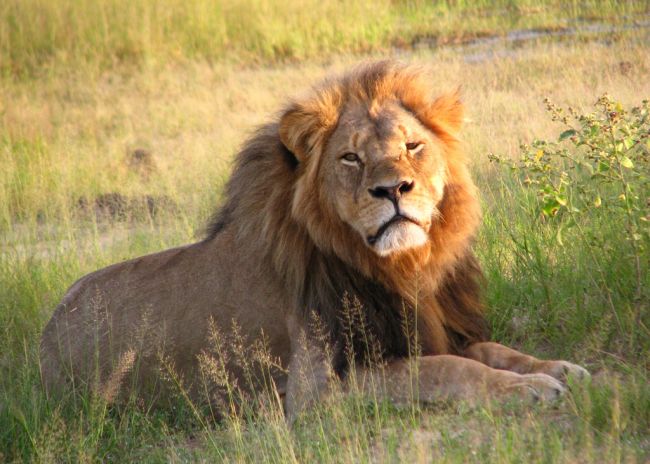
Last month, a great tragedy occurred in the animal kingdom, when a notable African lion was killed by a foreign big-game hunter. The news that a Southwest African lion named Cecil was murdered by a paid game hunter created a great outrage across the world. Though hunting game in Africa with guns is indeed allowed (with certain permits and quota limitations based on regions), the area in which Cecil was killed was out of jurisdiction, thereby making the kill illegal. The loss of this lion’s life has been greatly mourned, not only for the ethical and environmental implications, but also because he was a beloved and popular creature.
Cecil’s Life
Cecil the lion, born 13 years ago, was named for the British imperialist Cecil Rhodes (for whom the Rhodes Scholar at Oxford University, and the South African Rhodes University is named). The large lion was first spotted in 2008 in the Hwange National Park of in Zimbabwe. From the first discovery of Cecil, the lion had been under close observation, studied by a group of scientists at the Wildlife Conservation Research Unit at Oxford University. In 2009, Cecil was wounded in a fight with an established lion pride leader, and was forced to withdraw to another part of the reserve to create his own pride of lions. When his pride exceeded 22 lions, Cecil was then forced out again in 2013 by two tenacious young lions. Joining forces with another male lion named Jericho, Cecil was able to form another pride with six female lions and nearly a dozen lion cubs by the end of 2013. Visitors to the Hwange National Park could easily identify Cecil by his tracking collar, striking black-tipped mane, and his apparent ease with human presence.
In the early summer of 2015, a successful American dentist named Walter Palmer reportedly offered $50k to a game hunter named Theo Bronkhorst to kill him a lion. Assisted by local Zimbabwean guides, Bronkhorst attained what he believed to be lawful permits for bow-hunting in the region. He and a team then pursued Cecil, killing him and taking the skin. When Palmer was told the hunt had been illegal, he stated a moving apology of his regret that the parameters of lion-hunting as acceptable in Africa had not been met with, and the celebrated lion died as a result.
Following Cecil’s Death
The aftermath of killing Cecil has brought Walter Palmer and Theo Bronkhorst thousands of death-threats and hate messages, as well as legal accusations. The loss of Cecil united individuals, academics, animal conservationists, activists, politicians, public leaders, and celebrities to condemn the killing of endangered species. Activists have been greatly incensed, and talk-show host Jimmy Kimmel began a campaign to raise $150k to benefit Oxford’s Wildlife Conservation Research Unit, in order to support protecting and tracking other lions in the future.
Over 900,000 social media users have signed a petition called “Justice to Cecil” in the hopes that African governments like that of Zimbabwe will make big-game hunting of endangered species a practice of the past. Though what will happen to Palmer and Bronkhorst as a consequence of this killing remains to be seen; the loss of Cecil the Lion has been felt by all animal-rights supporters and wild cat-lovers across the world.

